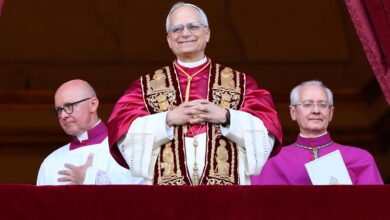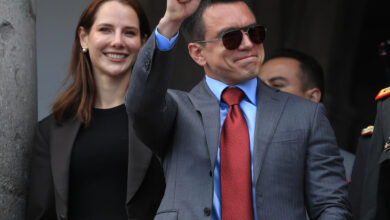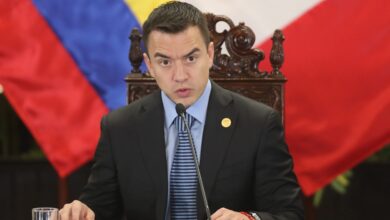Crisis In Peru: Dina Boluarte More Similar To Duque And Piñera Than Castillo
Dina Boluarte has been in office for more than a month since she assumed the executive mandate in Peru on December 7, 2022. Since then, the denial of the disproportionate reaction of the Public Force against the protesters, especially from the regions that have opposed this new mandate, has been constant.

Photo: Vice-Presidency of the Republic
LatinAmerican Post | Santiago Lozano
Listen to this article
Leer en español: Crisis en Perú: Dina Boluarte más parecida a Duque y Piñera, que a Castillo
The crisis in Peru seems like an endless plot. Being consistent with the fragility of the supports that keep her in office and understanding the context of constant change of head of government in the Andean nation, Dina Boluarte has copied the institutional response agenda developed by Iván Duque in Colombia and Sebastián Piñera in Chile. to delegitimize and confront the social outbreaks that shook their respective territories in past years.
Raúl Tecco, project director of the Friedrich Ebert Foundation affirmed that: " The forces of order are acting disproportionately and excessively. A soldier does not shoot if he does not have the support of his superiors ." This statement came amid the news of 17 people killed amid protests in the city of Juliaca, which would bring the number to at least 47 fatalities since the start of the protests.
Also read: The seizure of Congress in Brazil tests the relationship between Lula da Silva and the military
In turn, Johanna Pieper, from the German Institute for Global and Regional Studies (GIGA) stated that " The security forces are not acting by the law " contradicting the statements of President Dina Boluarte. The President, since taking office as Head of State, has alleged that the actions of the Public Force have been carried out within the framework of the constitutional protocol for responding to this kind of social event.
" Dina Boluarte, until now, denies that the Government and the Armed Forces generate violence. Similarly, the Prime Minister, Alberto Otárola, does not recognize police abuse and blames the protesters and the former government of Pedro Castillo," insisted the GIGA expert.
Speech Against Protesters
Political analysts linked this speech by the Peruvian president to maintaining the support of the police and military forces to stay in power at all costs. Related to this support from the executive, experts identified a racist and aporophobic narrative that has been spreading from the right-wing political spectrum against the protesters. Protestants are constantly pointed out in the mass media as radicals related to terrorist groups such as Sendero Luminoso who receive guidelines, financing, and logistical support from abroad.
Alonso Cárdenas, professor of Political Science at the Ruiz de Montoya University, maintains that "Peru is an extremely racist and highly discriminatory country, so much so that we don't even realize it anymore" arguing that this is one of the structural reasons to understand the profound disconnection of a large number of the inhabitants of Lima concerning the rest of the indigenous, peasant and rural country. He stressed that there is an issue of classism and “fear of losing the years of economic growth. They aspire to a more western model and they look at the deposed president Castillo and his electoral base and say: he does not represent me.
Terrucos
Anthropologist and political scientist Carmen Ilizarbe, a professor at the Pontificia Universidad Católica del Perú (PUCP) explained how a narrative has been spread to legitimize military and police violence against protesters by calling them “terrucos” or terrorists associated with Sendero Luminoso and other organizations radical left. After the elimination of the armed group Sendero Luminoso, a large part of the indigenous population was stigmatized under the name "terruco", a description that is used in the Peruvian Parliament or in social networks to refer to those who promote left-wing proposals. “ All the impoverished sectors of the country are potentially terrucos, that is the imaginary one”, comments Ilizarbe.
Deathly Victims
In the recent days of protest, the mobilizations have interrupted the transit of cargo and passengers in 6 regions, with at least 61 blockades and affectations in 12 national highways. The most recent fateful balance left 17 people killed with projectiles in the violent clashes that occurred in the vicinity of the Juliaca air terminal. "Up to this time of night, we have confirmed 17 deaths in Puno during clashes with law enforcement in the vicinity of the Juliaca Airport," a source from the Ombudsman's Office in Lima told AFP. "What is happening is a massacre among Peruvians, I ask you to calm down, do not expose yourselves," said the mayor of Juliaca, Oscar Cáceres.
With the deaths registered in the framework of the massacre that occurred in Juliaca, the number of fatalities rises to 47 since the political crisis began in the country last December, according to data from the Ombudsman's Office. The organ detailed that " 39 civilians have died in clashes with the forces of order, another seven due to traffic accidents and events related to the blockade of the protests and a police officer, due to acts of violence in the context of the conflict ." In addition, he reported that a total of 542 civilians and 290 police officers have been injured amid these demonstrations.
Effective Communication Between Protesters And The Government Is The Way Out Of The Crisis
According to the GIGA expert, Johanna Pieper, "If Dina Boluarte resigned now, the country would be governed by the president of Congress, who has even more disapproval than the Executive. Due to logistics and organization issues, the elections cannot be brought forward to 2023. In addition, there is a danger that the political offer will be the same as in the 2021 election. Finally, Pedro Castillo cannot be released until the investigations are finished."
In this way, it is proposed that to de-escalate the violence, serious judicial investigations should be initiated into the alleged abuses by the Armed Forces, as well as the establishment of dialogue channels with the protesters that allow local agreements to be reached to carry out new presidential elections in a peaceful.
For the project director of the Friedrich Ebert Foundation, Raúl Tecco, the country needs a political agreement that includes the resignation of the Presidency and Congress, "which should name someone who can temporarily govern in the next three months, before an election is held."
Finally, Robert Helbig, from the Konrad Adenauer Foundation, believes that "forceful political gestures are needed, both from the Executive and the Legislative, to appease spirits, demonstrating empathy and solidarity for the loss of life."




